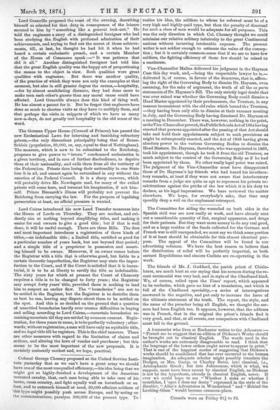Vice-Chancellor Malins delivered his judgment in the Hayman Case this
day week, and,—being the respectable lawyer he is,— delivered it, of course, in favour of the demurrer, that is, affirm- ing the right of the Governing Body to dismiss Dr. Hayman, even assuming, for the sake of argument, the truth of all the ex parte statements of Dr. Hayman's Bill. The only strictly legal doubt that was ever raised was whether the Governing Body could dismiss a Head Master appointed by their predecessors, the Trustees, in any manner inconsistent with the old rules which bound the Trustees, —they having been only able to dismiss at their summer meeting in July, and the Governing Body having dismissed Dr. Hayman at a meeting in December. There was, however, nothing in the point, as theVice -Chancellor proved, th eP ublic Schools Act of 1864 having enacted that persons appointed after the passing of that Act should take and hold their appointments subject to such provisions as might be subsequently enacted, and the Act of 1868 having given absolute power to the various Governing Bodies to dismiss the Head Masters. Dr. Hayman, therefore, who was appointed in 1869, took his appointment, though he took it from the old Trustees, as much subject to the control of the Governing Body as if he had been appointed by them. No other really legal point was raised. The judgment of the Vice-Chancellor must have disappointed those of Dr. Hayman's lay friends who had heard his interlocu- tory remarks, at least if they were not aware that interlocutory remarks from a judge are quite as apt to represent his private re- calcitrations against the pricks of the law which it is his duty to declare, as his legal impressions. We have reviewed the matter elsewhere. We hope, for everybody's sake, that time may speedily drop a veil on the unpleasant retrospect.


































 Previous page
Previous page